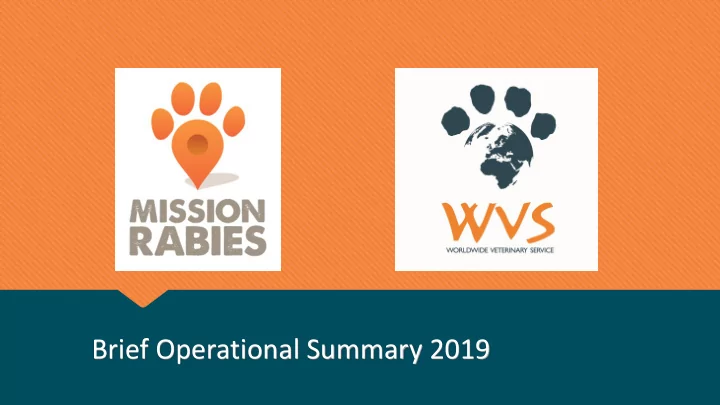

Brief Operational Summary 2019
About WVS & Mission Rabies Based in Cranborne, Dorset, UK and registered in the UK & US Working synergistically to facilitate disease elimination programmes and champion animal welfare Practically focused and privately funded (grants & donations)
WVS provides: Veterinary parcels of medication and equipment Vet teams Disaster Emergency Response Vet training (ITCs) Outreach projects To registered not-for-profit organisations
What WVS Do Aims to provide a fast and effective veterinary response to animals in need all over the world, assisting other animal welfare charities and sanctuaries to promote the highest level of animal welfare We act as a central veterinary resource offering free care to animals around the world by supplying teams of vets, nurses, medicine and equipment in places no one else can.
Our Biggest Achievements… We currently support over 850 charities worldwide In 2018 alone, we: Sent out 1,056 aid Treated parcels 65,687 Sent out animals 133 vet teams
Our International Training Centres Native and international vet training Hands-on experience of soft tissue surgery and spay/neutering Real-life, challenging cases Brand new environment, culture and country Gain practical and professional skills Gain confidence in veterinary techniques
ITC India (Ooty)
ITC Goa
ITC Thailand
Some recent rescues! Chom Deuan was left paralysed after being hit by a car, but now walks again thanks to WVS Thailand! Apple went from this… to this! Half The team at the BSPCA in Malawi her face had been eaten away by removed a large tumour from this maggots when she arrived at WVS. dog! This Thai dog had a tumour the size of a man’s fist.
What Mission Rabies do We run mass canine vaccination, community education and surveillance programmes in global rabies hotspots in line with the global goal to eliminate dog bite mediated human rabies deaths by 2030! Together with our partners like the US CDC, we develop novel approaches to rabies elimination which are published in peer-reviewed journals
Where we work Goa, India Uganda Ghana Cambodia Thailand Blantyre, Malawi Sri Lanka Tanzania
What is rabies? Rabies is a deadly virus – it is almost 100% fatal It is a zoonotic disease and can affect any mammal – reservoir species are often dogs, raccoons, skunks, monkeys, bats The virus is present in the saliva of affected animals When an animal bites another, virus enters the wound and attaches to nerve ending Infection can also occur if saliva enters the body through broken skin or contact with mucous membranes Travels up nerve to central nervous system
Effects on the patient When the virus reaches the brain, the symptoms begin. By then it is too late to save the patient. Two types: furious vs dumb (paralytic) rabies Symptoms include: Inability to swallow (not eating/drinking) Confusion Aggression Change in voice/bark Drooling saliva Incoordination Paralysis Coma Death (within 1-2 weeks)
Key Stats Majority of people who die are low-income socioeconomic status 30-60% of victims are children under 16years 1 Access to post-exposure prophylaxis (PEP) is variable in many parts of the world - often prohibitively expensive (31 days wage average Asian, 51 days average African) 2 Estimated global cost €8.6billion (3.7 million DALYs) 3 In many endemic countries rabies is not notifiable, no organised in-country surveillance and very little investment in control programmes 1 Bulletin of the WHO; Vol 87, No 12, Dec 2009, 885-964 2 WHO Expert Consultation on Rabies 2013 3 Hampson K, Coudeville L, Lembo T, Sambo M, Kieffer A, Attlan M, et al. Estimating the Global Burden of Endemic Canine Rabies. PLoS Negl Trop Dis. 2015;9: e0003709. doi:10.1371/journal.pntd.0003709
Our impact in India 66 positive (6 months) 17 - tested at NIMHANS symptomatic 0 Goa human rabies laboratory cases diagnostics 0 human 0 surveillance diagnostics 0 government supported dog vaccinations
Our impact in India 39 positive (6months) Lab capacity in DIU 2 human deaths PM facilities 1.5 Lakh children, 7,000 teachers taught about rabies 96,000 government Human rabies supported vaccinations diagnosis
Mission Rabies achievements Dogs vaccinated: 1,200,000 Children educated: 2,450,000
Thank you! For more info: Call us on +44 (0) 1725 557225 Email me at fred@missionrabies.com
Recommend
More recommend